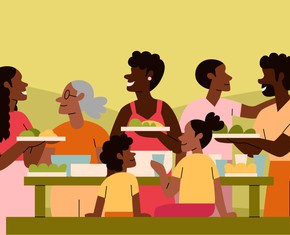The views expressed in our content reflect individual perspectives and do not represent the authoritative views of the Baha'i Faith.
Remember the last time you said something—and immediately wanted to take it back? Too late—once we utter words, they’re not returnable.
We don’t always think before talking, conversing, commenting, or otherwise communicating. Unless we ponder first, and then concentrate on the words spoken, we may say something that won’t be well-received.
Everyone knows that words can be hurtful or helpful, loving or hateful, kind or brusque and even more nuanced when we add physical motion such as waving our arms or raising an eyebrow. Our speech can be free and open or controlled and guarded, depending on the circumstances.
To avoid the difficulties inherent in human communication, the Baha’i teachings advise the use of a new communications technique called consultation:
In this Cause consultation is of vital importance, but spiritual conference and not the mere voicing of personal views is intended. … consultation must have for its object the investigation of truth. He who expresses an opinion should not voice it as correct and right but set it forth as a contribution to the consensus of opinion, for the light of reality becomes apparent when two opinions coincide. A spark is produced when flint and steel come together. Man should weigh his opinions with the utmost serenity, calmness and composure. Before expressing his own views he should carefully consider the views already advanced by others. If he finds that a previously expressed opinion is more true and worthy, he should accept it immediately and not willfully hold to an opinion of his own. By this excellent method he endeavors to arrive at unity and truth. – Abdu’l-Baha, The Promulgation of Universal Peace, p. 72.
Members of Baha’i communities and institutions practice Baha’i consultation, which tries to be kind, open, purposeful and action oriented.
Baha’is understand that human utterance has penetrating power, and Baha’u’llah decreed that the hearts and minds of men and women were best influenced through its moderate use, and not through the use of force:
Utterance must needs possess penetrating power. For if bereft of this quality it would fail to exert influence. And this penetrating influence dependeth on the spirit being pure and the heart stainless. Likewise it needeth moderation, without which the hearer would be unable to bear it, rather he would manifest opposition from the very outset. And moderation will be obtained by blending utterance with the tokens of divine wisdom which are recorded in the sacred Books and Tablets. Thus when the essence of one’s utterance is endowed with these two requisites it will prove highly effective and will be the prime factor in transforming the souls of men. This is the station of supreme victory and celestial dominion. Whoso attaineth thereto is invested with the power to teach the Cause of God and to prevail over the hearts and minds of men. – Baha’u’llah, quoted by Shoghi Effendi in God Passes By, p. 319.
Accordingly, consultation uses human speech to bring about love and harmony among all people:
O friends, consort with all the people of the world with joy and fragrance. If there be to you a word or essence whereof others than you are devoid, communicate it and show it forth in the language of affection and kindness: if it be received and be effective the object is attained, and if not leave it to him, and with regard to him deal not harshly but pray. The language of kindness is the lodestone of hearts and the food of the soul; it stands in the relation of ideas to words, and is as an horizon for the shining of the Sun of Wisdom and Knowledge. – Abdu’l-Baha, A Traveller’s Narrative, p. 43.
Baha’i consultation is not simply discussion, or airing the views of those participating. It is a collective investigation of reality, whose purpose centers on achieving clarity and truth.
The ultimate goal of Baha’i consultation: to arrive at a unanimous decision. When that doesn’t happen, the will of the majority prevails, taking into account the needs of the minority. Once a decision is made, all abide by and support it, else it would have no chance of succeeding.
If a decision turns out to be incorrect, only unified action in pursuit of that conclusion will reveal the fact that it is wrong. Baha’i consultation, then, can later revisit and correct that decision in harmony and unity.
















Comments
Sign in or create an account
Continue with Googleor